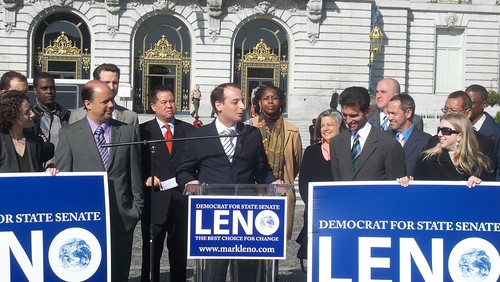(I want to welcome SF Assessor-Recorder Phil Ting. In addition to being pretty good at his job, he’s also an all-around good guy. Welcome to Calitics! – promoted by Brian Leubitz)
It’s time to acknowledge that the “Third Rail” culture in Sacramento has sent California seriously off track.
Most of us know that Proposition 13 – specifically the vast corporate tax loopholes it contains – is the cause for much of California’s fiscal mess. As the elected Assessor-Recorder in San Francisco, I have a vantage point that allows me to see the tremendous inequity in a law that makes many struggling homeowners pay disproportionately more in property taxes than corporations with downtown office buildings.
Many of our leaders in Sacramento privately acknowledge the flaws in Proposition 13. A small few are brave enough to step forward and call for reform.
But too many others say that this “Third Rail” of politics needs to remain untouched, so instead they offer half solutions and political smokescreen as a substitute for real reforms. Edit by Brian for space, see the flip…
But now is the perfect time to demand our leaders stop ducking problems like Proposition 13 and start solving them. I’m currently working on a proposal to reform Prop. 13, the 1978 ballot initiative that capped the state's property tax rate and created vast loopholes and tax shelters for commercial property owners. You can read more about my proposal and about the crisis California faces in an op-ed piece I wrote in the San Francisco Chronicle last week.
While proponents of Prop. 13 initially touted the protections it offered California homeowners, today, the biggest beneficiaries of Prop. 13 are large companies and corporate landowners who use tax loopholes and shelters to avoid paying their fair share of property taxes.
Prop. 13 opened up loopholes for corporate landowners so their properties are often never reassessed and their property taxes remain at artificially low levels forever. This has shifted the tax burden to the backs of individuals and first-time homeowners and has dramatically reduced California's overall tax base, forcing the draconian cuts to vital services that we see today.
Here’s a staggering example: 30 years ago in San Francisco, commercial property owners contributed 59 percent of property tax revenues while residential property owners contributed 41 percent. Today, we see a virtual flip: commercial property owners contributed just 43 percent of property taxes in 2008 while residential property owners contributed 57 percent.
The more our property tax roll is limited by Prop. 13, the more we rely on regressive taxes and fees, like sales taxes, and we find our state in a perpetual budget crisis. California is losing billions of dollars on corporate property tax loopholes.
My proposal for a split roll system would eliminate corporate tax loopholes. It would rework Prop. 13 to literally split the property tax rolls – assigning appropriate tax levels to corporations while continuing to protect homeowners.
I am organizing a grassroots, netroots community around closing the corporate property tax loopholes in Prop. 13 and creating a split roll system. You can learn more about our campaign and join our cause on our Facebook page or by signing the petition on our website at www.CloseTheLoophole.com.
Most politicians in Sacramento still won’t touch Prop. 13. That’s why we need to take on this issue from the grassroots and build the support necessary to require reform. I hope you will join me on Facebook and at www.CloseTheLoophole.com.
Phil Ting is the Assessor-Recorder of San Francisco.
 We’ve mentioned Phil Ting’s quest to split the property tax rolls a bunch of times, but I wanted to draw special attention to an event in San Francisco to organize for this vital structural reform. And if this is going to get done, there has to be a real grassroots movement to grab the 1,000 volt third rail of California politics.
We’ve mentioned Phil Ting’s quest to split the property tax rolls a bunch of times, but I wanted to draw special attention to an event in San Francisco to organize for this vital structural reform. And if this is going to get done, there has to be a real grassroots movement to grab the 1,000 volt third rail of California politics.



